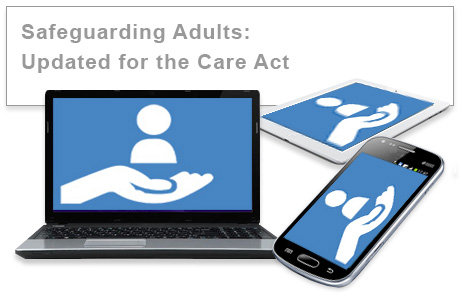safeguarding-adults-updated-care-act-f
Safeguarding Adults - Updated For The Care Act (F): e-learning training course

Key changes in legislation regarding vulnerable adults, including the introduction of the Care Act 2014, have made this e-learning course essential training for those working as adult carers. Recognition of abuse and its causes are covered in depth, as are the legal position and issues of risk management. Real-life case studies bring the theory into sharp focus.
The course provides a highly effective way to raise awareness and equip workers with the underpinning knowledge and key skills to identify abuse and take appropriate action. It is aimed at anyone who works with adults or is in the position of providing training in the safeguarding of adults at risk.
This course can be used in addition to conventional training and is a useful alternative for those who prefer to work at their own pace and at a time and place of their choosing.
Unit Titles and Descriptions
Unit 1 - About the Course
Unit 2 - Basic Awareness in Safeguarding Adults
This unit identifies the key changes that the Care Act 2014 introduces to the way we protect and support adults at risk. It also sets out the key principles involved in safeguarding and describes the different types, signs and symptoms of abuse that people need to be aware of.
The unit also identifies some of the risk factors that people need to look out for in order to help to prevent abuse from taking place.
Understanding basic awareness assists practitioners to identify adults at risk and work towards protecting their welfare.
Unit 3 - The Role of the Practitioner in Safeguarding Adults
This unit helps learners to understand what is expected of someone who alerts others to abuse and how to deal with disclosure. Although methods for dealing with disclosure may differ slightly depending on local procedures, this unit provides general guidance about what to do and who to contact if there is a suspicion that abuse is taking place. The unit concludes by providing a brief introduction to the legal framework that supports adults at risk.
Unit 4 - The Role of the Investigator in Safeguarding Adults
This unit focuses on the role of the investigator and will look at some of the changes the Care Act 2014 introduces. It includes a description of Safeguarding Adults Boards, which local authorities have a duty to set up under the new Act.
The unit provides learners with a clear understanding of the context in which different agencies operate and differences between inter-agency procedures. The course concludes by looking at the types of plans, meetings and discussions which form part of an investigation into abuse.
Learning Objectives: at the end of the course, students will be able to:
- Identify the changes that the Care Act 2014 introduces in relation to safeguarding adults
- Explain the principles involved in safeguarding people
- Define the terms at risk, protection and abuse
- List different types of abuse and recognise the possible signs and symptoms of each type
- Describe risk management and prevention in relation to adults at risk
- Explain how to raise a concern about abuse
- Describe the procedure for ''alerting''
- Identify procedures for 'whistleblowing'
- Recognise the effects of abuse in those who have to deal with it
- Name the relevant local agencies involved in investigations of adults at risk
- Differentiate between the roles and responsibilities of member agencies
- Identify inter-agency procedures
- Describe what a strategy discussion is and who attends
- Explain what is meant by an Adult Safeguarding Plan.
A Safeguarding Children course is also available.
Copyright Notice | Terms and Conditions | Privacy Statement | Disclaimer |
Copyright © 2006 - 2024 Embrace Learning Ltd.